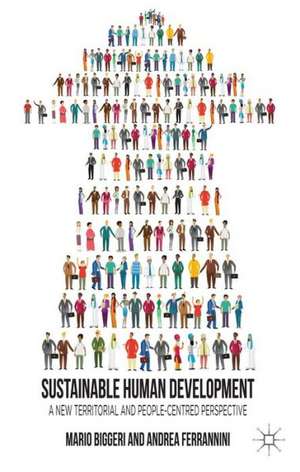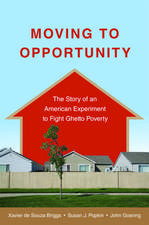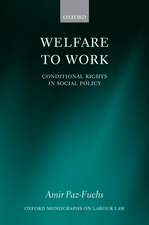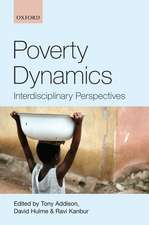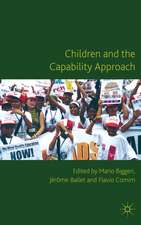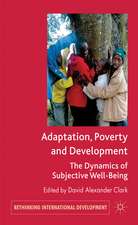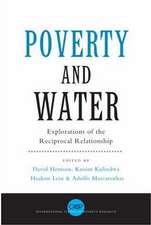Sustainable Human Development: A New Territorial and People-Centred Perspective
Autor M. Biggeri, A. Ferranninien Limba Engleză Hardback – 22 aug 2014
| Toate formatele și edițiile | Preț | Express |
|---|---|---|
| Paperback (1) | 635.65 lei 6-8 săpt. | |
| Palgrave Macmillan UK – 2014 | 635.65 lei 6-8 săpt. | |
| Hardback (1) | 641.85 lei 6-8 săpt. | |
| Palgrave Macmillan UK – 22 aug 2014 | 641.85 lei 6-8 săpt. |
Preț: 641.85 lei
Preț vechi: 755.13 lei
-15% Nou
Puncte Express: 963
Preț estimativ în valută:
122.81€ • 128.23$ • 101.65£
122.81€ • 128.23$ • 101.65£
Carte tipărită la comandă
Livrare economică 04-18 aprilie
Preluare comenzi: 021 569.72.76
Specificații
ISBN-13: 9781137380289
ISBN-10: 1137380284
Pagini: 248
Ilustrații: XIX, 221 p.
Dimensiuni: 140 x 216 x 19 mm
Greutate: 0.46 kg
Ediția:2014
Editura: Palgrave Macmillan UK
Colecția Palgrave Macmillan
Locul publicării:London, United Kingdom
ISBN-10: 1137380284
Pagini: 248
Ilustrații: XIX, 221 p.
Dimensiuni: 140 x 216 x 19 mm
Greutate: 0.46 kg
Ediția:2014
Editura: Palgrave Macmillan UK
Colecția Palgrave Macmillan
Locul publicării:London, United Kingdom
Cuprins
Prologue; Giacomo Becattini Foreword; Santosh Mehrotra Introduction? 1. Sustainable Human Development (SHD) at the Local Level? 1.1 Introduction? 1.2 Unexplored synergies between the Capability Approach and the local development perspective? 1.3 Rationales for a new SHD perspective at the local level? 1.4 Structural elements of SHD at the local level ? 1.5 Some clarifications about the new perspective? 1.6 Conclusions? Appendix 1.1 Levels and trajectories of SHD at the local level ? 2. The Sustainable Territorial Evolution for Human Development (STEHD) Framework? 2.1 Introduction? 2.2 The STEHD framework? 2.3 Exploring the territorial dynamics of SHD processes?through the STEHD framework 2.4 What is the STEHD framework for?? 2.5 Conclusions? Appendix 2.1 Alternative ways for the modeling of LDSs? 3. The Role Of Multilevel Governance for SHD at the Local Level? 3.1 Introduction: A world with no isolated territories? 3.2 The horizontal and vertical articulation of SHD processes? 3.3 An evolutionary analysis of multilevel governance mechanisms for SHD at the local level ? 3.4 Multilevel governance mechanisms for SHD: Evidence from two Latin American countries ? 3.5 Conclusions? Appendix 3.1 Multilevel governance and international coordination? 4. International Development Cooperation at the Local Level: The UNDP ART Global Initiative? 4.1 Introduction: Rethinking international development cooperation 4.2 The characteristics of the UNDP ART Global Initiative ? 4.3 Comparing traditional aid policies and the ART Initiative ? 4.4 Analysing ART processes enabling SHD? 4.5 Conclusions? Appendix 4.1 Structured Focus Group Discussions as a tool to analyse complex development programs? 5. Enabling Factors for Local Economic Development: Local and Regional Development Agencies? 5.1 Introduction: Exploring local governance tools for SHD? 5.2 LEDAs' main features and operational issues? 5.3. LEDAs' enabling processes for local economic development? 5.4 An empirical example of local 'Meta-Organiser': REDASP (SR)? 5.5 Conclusions ? Appendix 5.1 Relevant projects implemented by REDASP? 6. A 'Policy-Enabling Space' for SHD at the Local Level ? 6.1 Introduction: Going behind policy recommendations? 6.2 Policy evolution and conflict dynamics? 6.3 Elements of a 'policy-enabling space' for SHD? 6.4 Conclusions? Appendix 6.1 How to evaluate complex and context-specific development programs? 7. Final Remarks and Future Perspectives for SHD at the Local Level? 7.1 The relevance and novelty of SHD at the local level? 7.2. What applications for SHD at the local level? ? 7.3. What future for SHD at the local level? Annex A: List of UNDP Human Development Reports on Local Development Issues
Recenzii
'The book's perspective is especially relevant, as the world cogitates about the post-2015 Sustainable Development Goals agenda, because in the next few decades the synergies between local development and human development will become more salient than ever before.' Santosh Mehrotra, Institute of Applied Manpower Research, Government of India
'This book is a timely and innovative contribution to bridging the gap between the capability and local development literatures. The authors develop a powerful conceptual framework that is likely to become an essential starting point for policymakers and those committed to promoting sustainable human development within and across regions.' David A. Clark, University of Cambridge, UK
'A comprehensive analysis of the conditions for, and the contribution of actors to, sustainable human development at the local level. An important contribution to overcoming the traditional barriers between the social sciences in order to enrich Amartya Sen's capability approach.' Franco Volpi, University of Florence, Italy
'This book is a timely and innovative contribution to bridging the gap between the capability and local development literatures. The authors develop a powerful conceptual framework that is likely to become an essential starting point for policymakers and those committed to promoting sustainable human development within and across regions.' David A. Clark, University of Cambridge, UK
'A comprehensive analysis of the conditions for, and the contribution of actors to, sustainable human development at the local level. An important contribution to overcoming the traditional barriers between the social sciences in order to enrich Amartya Sen's capability approach.' Franco Volpi, University of Florence, Italy
Notă biografică
Mario Biggeri is Associate Professor in Development Economics at the Department of Economics and Management of the University of Florence, Italy, and Scientific Director of ARCO Lab (Action Research for CO-development). He has conducted research for a number of international organizations on capability approach, international cooperation, impact evaluation, local development, well-being of children and persons with disabilities. He is Fellow of the Human Development Capability Association (HDCA) and scholar of the 'Florence School' on Local Development.
Andrea Ferrannini is Coordinator of the Strategic Unit on Local Development of ARCO Lab (Action Research for CO-development), PIN S.c.r.l., University of Florence, Italy. He has been working in several countries such as the Dominican Republic, Uganda, Ethiopia, Albania and Serbia, acquiring expertise on local development processes, human development and participatory methods.
Andrea Ferrannini is Coordinator of the Strategic Unit on Local Development of ARCO Lab (Action Research for CO-development), PIN S.c.r.l., University of Florence, Italy. He has been working in several countries such as the Dominican Republic, Uganda, Ethiopia, Albania and Serbia, acquiring expertise on local development processes, human development and participatory methods.
